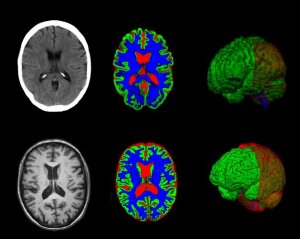by
John R. Fischer, Senior Reporter | October 23, 2023

Researchers have developed a new deep learning software that transfers MR imaging interpretations to CT scans of the same brain. (Photo courtesy of the University of Gothenburg)
Researchers at the University of Gothenburg in Sweden have developed a new deep-learning software that transfers information and interpretations found on MR scans to CT images.
The solution, which was trained on scans from 1,117 people who each underwent both CT and MR imaging, is currently supporting dementia diagnoses, but may have other applications in neuroradiology and could also reduce the number of false negatives with CT.
"Our main aim is to improve the use of already performed CTs in clinical routine," Michael Schöll, a professor of molecular medicine at the University of Gothenburg who led the study, told HCB News. "We do believe, however, that there will be instances where CT could replace MR imaging, thus increasing CT utilization further."



Ad Statistics
Times Displayed: 174467
Times Visited: 3182 For those who need to move fast and expand clinical capabilities -- and would love new equipment -- the uCT 550 Advance offers a new fully configured 80-slice CT in up to 2 weeks with routine maintenance and parts and Software Upgrades for Life™ included.
In their study, the researchers evaluated the software’s performance on healthy older individuals and patients with various forms of dementia, finding that imaging, cognitive, and biochemical biomarkers of neurodegenerative diseases obtained on these scans with the deep learning software were comparable to those obtained with MR imaging, even among early-stage disease patients.
They are now studying its ability to help diagnose normal pressure hydrocephalus, where fluid buildup in the cerebral ventricular system leads to neurological issues, saying it could reduce the number of missed cases of NPH.
The solution has been in development for years, and the researchers have partnered with Karolinska Institutet, Lund University, and Uppsala University in Sweden, as well as the National University of Singapore to further develop it.
Schöll and his colleagues are also working with an unnamed American company to eventually submit it for regulatory approval and introduce it to healthcare settings.
The findings were published in
Alzheimer’s & Dementia.

